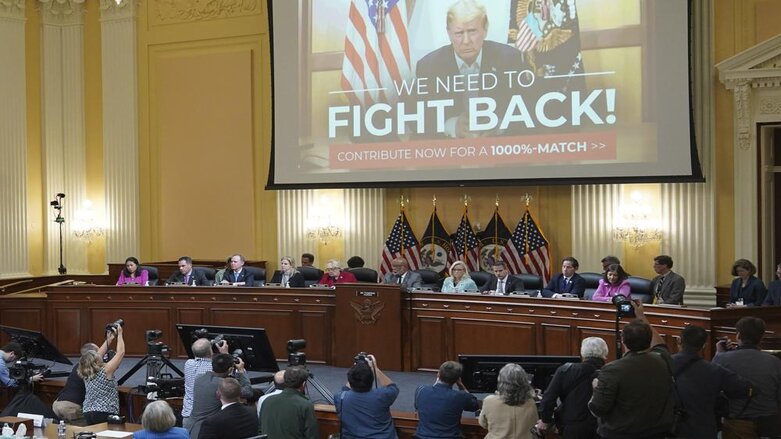Jan. 6 committee shows Trump as willful and deceitful

WASHINGTON DC (Kurdistan 24) – Monday marked the second day of hearings convened by the House Select Committee to investigate the Jan. 6, 2021, siege of the US Capitol, which aimed at blocking the ratification of Joe Biden's electoral victory.
Monday's session focused on showing that former President Donald Trump was repeatedly told by his most senior advisors, including Attorney General William Barr, that Biden had won and there was no evidence of fraud on any level even approaching what would be required to overturn the results.
The testimony was all the more powerful because it came from individuals appointed to their positions by Trump. They offered a damning account of Trump's unwillingness to accept their unanimous conclusion: he had lost the 2020 election.
Thus, Trump appears as an extraordinarily willful figure. Most likely, he understands that he lost, but he is unwilling to acknowledge it.
Trump Turned to Sycophants
After his official advisors told him that he had lost the elections, Trump turned to others, outsiders who told him what he wanted to hear: two lawyers, Rudy Giuliani, mayor of New York from 1994 to 2001, and Sidney Powell, a former federal prosecutor from Dallas, Texas.
The positions they have taken, including in the courtroom, have been so unsupported by evidence that both lawyers now have problems with the justice system. Giuliani has had his license to practice law in New York state suspended for "demonstrably false and misleading statements to courts."
Powell faces possible sanctions and disbarment in Michigan. She is also being sued for defamation by Dominion Voting Systems, which she alleged, in a truly bizarre claim, used software that had been programmed "at the direction" of the late Venezuelan President Hugo Chavez and was part of a plot to control the US election, by shifting Trump votes to Biden.
Dominion responded by suing Powell for defamation. She defended herself, as Rep. Zoe Lofgren (D, California) noted in Monday's hearing, by saying that "no reasonable person would conclude her statements were truly statements of fact."
In other words, Powell's defense is that she told such a wild, unfounded charge that no reasonable person would really believe what she had said!
Yet, as Barr stated in his own videotaped statement to the Jan. 6 committee, he found that charge "to be among the most disturbing allegations."
"Disturbing in the sense that I saw absolutely zero basis for the allegations," Barr explained. "But they were made in such a sensational way that they obviously were influencing a lot of people"—that there was a "systemic corruption in the system" and "their votes didn't count" because "these machines controlled by somebody else were actually determining it."
Barr summarized that charge as "complete nonsense."
Indeed, in his last meeting with Trump, on Dec. 14, 2020, Trump pressed Barr on a report from a cybersecurity firm that had concluded that the Dominion voting machines were rigged.
Barr was not impressed by the "very amateurish" report, which he regarded as worthless. "If [Trump] really believes this stuff," Barr concluded, "he's become detached from reality."
That night, Barr resigned as Attorney General.
On Election Night, Trump took Giuliani's Advice
More than Republicans, Democratic voters tend to vote by mail. That was particularly true in 2020 because Trump told his supporters to vote in person, not by mail. Trump did so against the advice of his campaign manager, Bill Stepien, and House Speaker, Kevin McCarthy.
But that is Trump, as the hearing suggested. He is capable of taking an arbitrary decision and just sticking with it, no matter what others, who may well be more knowledgeable, advise.
Yet the counting of mailed votes occurs after the tabulation of those who voted in person. This creates an early impression of greater Republican success than the final result will show. The pattern is well known, and Trump's advisers explained it to him in advance.
Yet as the committee's Vice-Chair, Liz Cheney, explained, "Trump rejected the advice of his campaign experts" and "instead followed the course recommended by an apparently inebriated Rudy Giuliani to just claim he won and insist that the vote counting stop, to falsely claim everything was fraudulent."
No Support for Trump in Legal Decisions
Benjamin Ginsberg is a long-time Republican election attorney. In the 2000 presidential election, the vote in Florida was very close: just 500 votes separated the Republican and Democratic candidates, George W. Bush and Al Gore. Ginsberg helped secure Florida for Bush and, with Florida, the election itself.
Ginsberg told Rep. Lofgren that of the 62 lawsuits the Trump campaign filed after the elections, "in no instance did a court find that the charges of fraud were real."
He also noted that there were post-election reviews in each of the six most highly contested states, "and in each one of those instances, there was no credible evidence of fraud produced by the Trump campaign or his supporters."
Describing the rejection of Trump's legal efforts as "overwhelming," Lofgren noted the non-partisan nature of those legal judgments, which involved "22 federal judges appointed by Republican Presidents, including ten appointed by President Trump himself" and at least 24 Republican state judges.
Next Session
"Today's hearing," Cheney explained in closing remarks, "was very narrowly focused."
"In the coming days, you will see the committee move on to President Trump's broader planning for Jan. 6, including his plan to corrupt the Department of Justice," Cheney continued as she signaled that yet a third lawyer is in the committee's crosshairs: John Eastman of California's Claremont Institute.
Cheney said the committee would reveal Trump's "detailed planning with lawyer John Eastman to pressure the Vice President, state legislatures, state officials, and others to overturn the election."
The committee will hold its next hearing on Wednesday.
